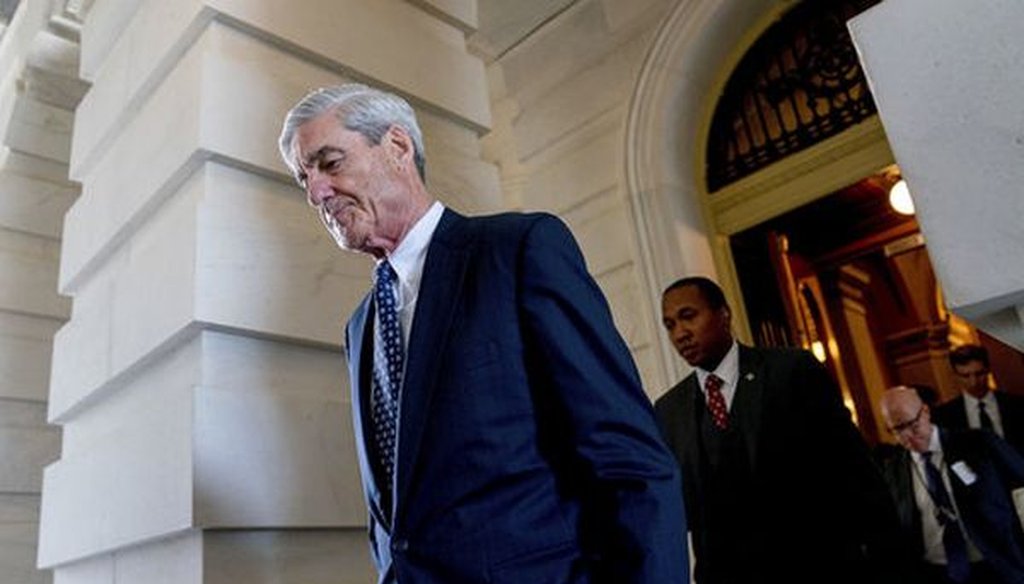Stand up for the facts!
Our only agenda is to publish the truth so you can be an informed participant in democracy.
We need your help.
I would like to contribute

Special Counsel Robert Mueller leaves the U.S. Capitol on June 21, 2017. (AP/Andrew Harnik)
Attorney General William Barr is poised to release the findings from the special counsel’s nearly two-year investigation into whether the Trump campaign coordinated in Russia’s 2016 election meddling, and if the president obstructed the probe.
But exactly how much of the nearly 400-page report will be published remains an open question. If history is any guide, Barr’s judgment about what should be obscured from public view will likely prove controversial.
The mechanics of how a special counsel report reaches the public is largely governed by federal regulations. But the redaction process — whereby certain information is deemed too sensitive to disclose — allows the attorney general a degree of discretion.
Barr released a four-page summary of Special Counsel Robert Mueller’s report three weeks ago. Mueller found the Trump campaign had not criminally conspired with Moscow. Mueller declined to say if Trump had obstructed justice, but Barr and the deputy attorney general concluded he had not.
From there, the attorney general, with the special counsel’s help, reviewed Mueller’s report to figure out which portions to conceal.
Sign up for PolitiFact texts
The Mueller report redactions are likely to become the latest front in a longstanding battle that pits national security and privacy interests against Americans' desire for a thorough understanding of the probe, which captured at least as much public interest as the Watergate and Iran-Contra investigations before it.
Barr has vowed to make public as much of Mueller’s report as possible. He told lawmakers in an April 9 hearing, "I am relying on my own discretion to make as much of it public as I can."
He cited four types of information that would require redaction, with each category to be blocked out in a different color. They include:
(1) Secret grand jury material;
(2) Information that might compromise intelligence community "sources and methods";
(3) Material that could affect other legal matters, including those referred by the special counsel to other offices; and
(4) Information that would violate the privacy or harm the reputation of "peripheral third parties."
The redaction of grand jury materials — the first category Barr listed — reflects the longstanding secrecy that has typically enshrouded grand jury proceedings, and helps to protect jurors, witnesses and other parties.
Grand jury secrecy is not ironclad, however. A judge can issue an order allowing information to be revealed, as happened amid the Watergate investigation. But during his April 9 hearing before Congress, Barr expressed an unwillingness to pursue such measures.
"The chairman of the Judiciary Committee is free to go to court if he feels one of those exceptions is applicable," Barr said, referring to the disclosure of grand jury material. "My intention is not to ask for it at this stage."
The second category protects sensitive spying methods that agents may have employed while probing the Trump campaign’s links to the Russian government, as well as information that could put sources’ safety at risk.
The Mueller probe spawned additional investigations that are being carried out by other prosecutors — and this third redaction category shields information relevant to these ongoing matters.
The final category keeps under wraps information that would "unduly infringe" on the privacy and reputational interests of third parties who were not central to Mueller’s investigation. This is where Barr may exercise the most discretion, and where critics might most loudly object.
Barr’s redactions are likely to be second-guessed by Democrats — and perhaps a federal judge.
Of the redaction categories, the attorney general has the widest discretion when it comes to determining privacy and reputational boundaries, as well as which people who factored into Mueller’s probe deserve such protections.
"Barr has a lot of leeway in his initial subjective assessment of how much third party information can be disclosed," said Bradley Moss, a national security law expert.
Yet Barr’s relatively wide latitude here is somewhat ironic, Moss said, because this redaction category is also the most vulnerable to being un-redacted by a judge.
"The U.S. government can and is required to redact third party information if it would constitute an unwarranted invasion of privacy," he said. "But the courts have the authority to overrule that in pending FOIA litigation if there is an overriding public interest in disclosure of that information."
By contrast, the Justice Department has less discretion when it comes to redactions concerning grand jury materials, intelligence classification and evidence pertaining to ongoing investigations.
The Supreme Court has long recognized a constitutional right to privacy, and the intelligence community has good reason to want certain information excluded from the public sphere, said Robert Turner, a law professor at the University of Virginia who specializes in national security.
Nonetheless, he anticipates that Barr’s redaction decisions will unleash a partisan battle.
An endorsement from Mueller that the redactions are reasonable and consistent with law and Justice Department practices could assuage skeptics, Turner said.
With a disclosure fight possibly on the horizon, we looked to historical precedent for what to expect.
During the Watergate scandal under President Richard Nixon, the question of keeping material secret largely revolved around the fate of grand jury testimony.
When the Watergate grand jury finished its work in the spring of 1974, they turned over a cache of documents related to their findings to John Sirica, the judge who was overseeing their work, said James D. Robenalt, an attorney with the firm Thompson Hine LLP and creator of a continuing legal education class on Watergate.
The grand jury made clear in its letter to Sirica that, even though the material would ordinarily be secret, they believed that it should be transmitted to Congress as part of the impeachment process. That would be allowed under an exception to grand jury secrecy — as long as Sirica agreed.
In his 22-page opinion, Sirica did agree, rejecting the arguments of some of the individuals discussed in the materials. Sirica ordered the grand jury material to be sent to Congress, though not to be made public. This material became known informally as the "roadmap" for Nixon’s impeachment — essentially a tip sheet for Congress that offered leads on possible avenues of investigation.
The Mueller grand jury would have been able to ask its presiding judge, Beryl Howell of the federal district court for the District of Columbia, to do the same thing as Sirica, Robenalt said. Whether they have done so is not currently known.
Meanwhile, Malcolm Byrne, deputy director of the National Security Archive and author of the book Iran-Contra: Reagan's Scandal and the Unchecked Abuse of Presidential Power, sees strong parallels between the redaction controversies during the Reagan-era investigation and the current dispute over releasing Mueller’s report.
Lawrence Walsh, the independent counsel for Iran-Contra, also faced a "highly unsympathetic Justice Department," Byrne said. Redactions proved to be "a significant issue," although they primarily involved national-security concerns as opposed to the other areas Barr has cited as possible reasons for redaction.
The attorney general during the Iran-Contra investigation, Richard Thornburgh, often "sided with the intelligence community at given points over questions about whether material could be introduced as evidence or even whether individuals could be brought to trial," Byrne told PolitiFact.
Our Sources
Attorney General William Barr letter to Congress, March 29, 2019
PolitiFact, "Without full Mueller report, Trump obstruction questions leave legal experts wondering," March 25, 2019
PolitiFact, "A summary of Special Counsel Robert Mueller’s report is now public. Here’s what it says—and doesn’t," March 24, 2019
New York Times, "William Barr Says Mueller Report Will Be Public ‘Within a Week,’ " April 9, 2019
New York Times, "Sirica Orders Jury File on Nixon Given to Panel on Impeachment; Accelerated Inquiry Is Expected," March 19, 1974
New York Times, "Text of Sirica Order and Opinion in Decision That Watergate Data Go to House," March 19, 1974
CNN, "Judge rules to unseal 11 cases related to Starr's Clinton investigation, following CNN request," April 17, 2018
Email interview with Bradley Moss, attorney specializing in national security law, April 17, 2019
Email interview with Malcolm Byrne, deputy director and director of research with the National Security Archive, April 17, 2019
Email interview with John Pike, director of globalsecurity.org, April 17, 2019
Email interview with Robert F. Turner, associate director of the University of Virginia’s Center for National Security Law, April 17, 2019
Interview with James D. Robenalt, attorney with the firm Thompson Hine LLP and creator of a continuing legal education class on Watergate, April 17, 2019




















































